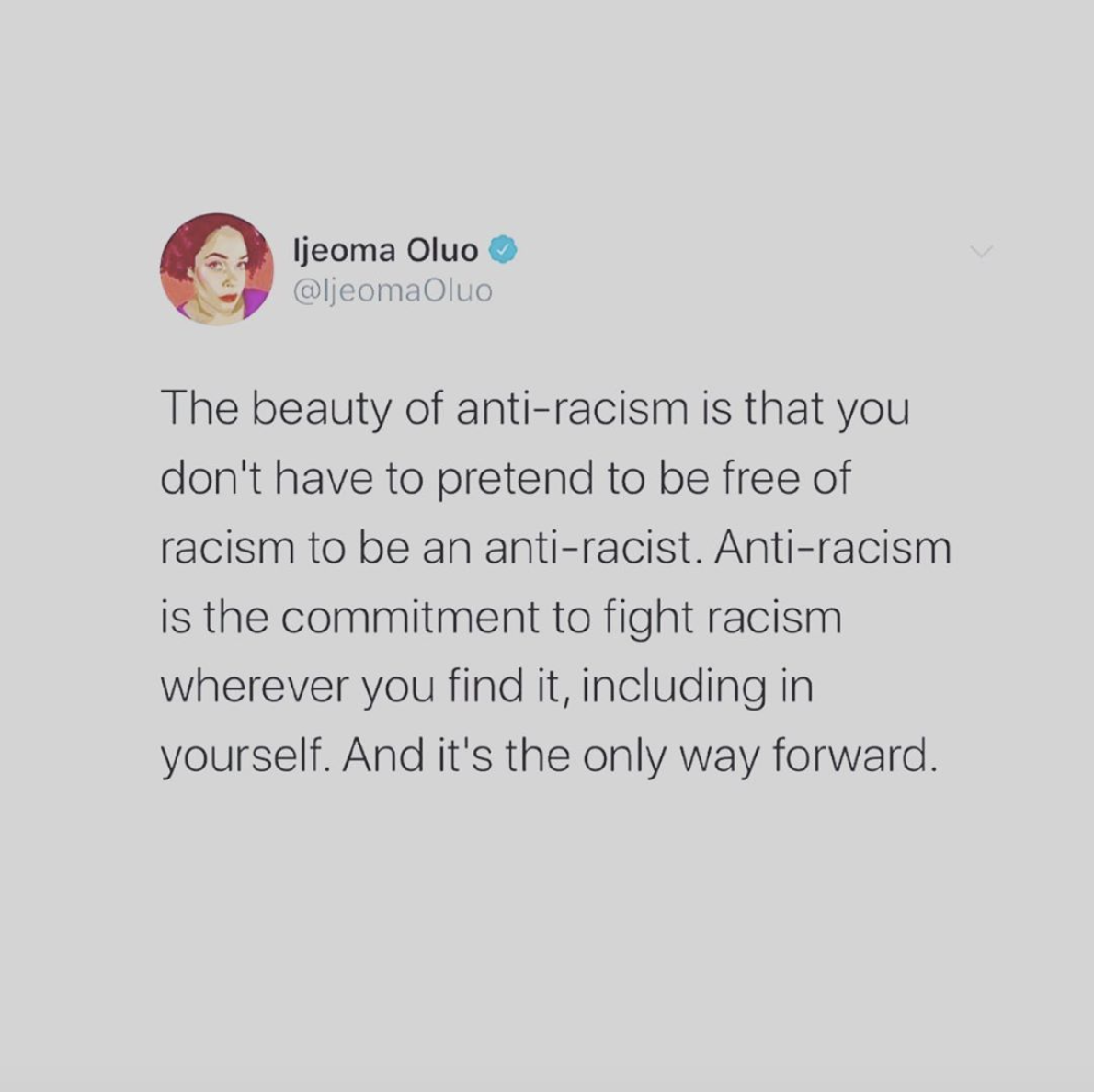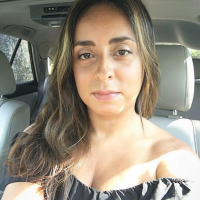Read next:
White People: Stop Saying “I’m Not Racist.”
~
I’ve struggled to find the words this week.
To find the balance between blind rage and constructive communication. To understand why I feel the need to find that balance at all.
I’m a Black Puerto Rican woman. I could write a book full of all the ways—big and small—that racism and bigotry and prejudice have become constant companions in my life. All the ways they have whispered, like the wind, at the back of my neck. All the ways they have slammed into my heart, like a bull let loose from its pen.
I’m never shocked when another Black man, woman, or child is killed. I’m devastated and angry and oftentimes hopeless—but never shocked. Again, this isn’t new to me.
I’ve spent my life having conversations about race. I’ve spent my life being made to feel different and less than, being made to feel like I needed to work harder and faster and longer just to belong. I’ve spent my life trying to find my voice in a country and world that constantly tells me that my voice, my experience, my story doesn’t matter and shouldn’t even exist.
And because I’m mixed, I’ve also spent my life realizing how privileged I am to exist in a world that sees me as brown, instead of Black. I have always known—because my parents and my community and the people and tools I chose to surround myself with taught me—that my lighter skin, my straighter hair, my ethnically ambiguous features are part of what have kept me safer than my Black family members, friends, partners, and co-workers.
This fact makes me sick and sad and broken in ways that I haven’t found the words for, but again, I am not shocked.
What I am shocked about is how fervently all the white allies showed up on social media this week. And how their response to George Floyd’s murder and the Black Lives Matter protests sent me deeper into the rage I didn’t think could get worse.
I want to talk to these allies, this group of people who have decided (finally) to show up in a movement that has been part of the fabric of this country for hundreds of years. I want to talk to my friends, my co-workers, my acquaintances.
What I need to say is meant to make you uncomfortable. Believe me, that’s 100 percent the point.
Dear White Allies,
I see you.
I see the Black Lives Matter memes you posted, the Martin Luther King Jr. quotes, the diatribes about how you were blind before but now you see.
I see you fill my newsfeed with posts about your feelings, how you can’t imagine and you don’t know what to say and you’re so terribly heartbroken and you stand with us always (always?).
I see your words meant to “check” white people, as a group, for being complicit when it comes to institutionalized, systemic racism.
But have you checked yourself this week—or ever?
Have you unpacked all your racist and racially biased views and opinions and feelings and actions and microaggressions?
Have you done that quietly and privately, in your own space, without feeling the need to post it on Instagram or Facebook?
I see you talk about “doing the work,” but do you know what doing the work means?
If, for you, it’s just performing on social media for likes or hearts or acceptance or to feel like you belong or to have others congratulate you for saying something powerful or important or so necessary right now, then you are not interested in creating change—you’re interested in creating content.
Yes, participating in protests, reading books and watching videos by Black activists, donating to racial justice organizations, supporting Black businesses, and widening your lens by following Black and brown activists on social media are vital, actionable steps that allies can and should take.
But what matters even more is what my sister calls “sitting in the yuck.”
This movement is not about you, as white allies, as white people…but your ability to truly show up as an ally is absolutely about you. It starts with asking the questions you’ve been too scared or uninterested or willfully ignorant to ask. The questions that make your skin crawl. The questions that make you want to hide. The questions that push you to confront how you were raised and how you have chosen to show up in the world until this week or this month or this year.
The questions that will lead to answers that your heart and your head and your ego are not prepared to hear.
Why haven’t you spoken up about racism until now or a year ago or four years ago?
What has kept you silent for so long about the systemic racism that has plagued our country for hundreds of years?
As a woman of color, I’m tired of the hashtags and overused quotes and cookie-cutter responses that are being highlighted by white allies on my newsfeed and social media in general. What I really want to see from those who consider themselves allies is the hard, sad, awful truth.
Own your racist beliefs.
Own how you were taught to be racist.
Own that you’ve carried these ingrained beliefs with you into adulthood.
It’s not enough to just say, “I know I’ve benefited from white privilege.” Tell me how. And tell me how you’ve perpetuated white privilege and white supremacy and racism through both your action and your inaction.
Sit in your yuck.
Tell me about all the beliefs, conscious and unconscious, that make you racist.
Tell me who taught you these beliefs. Your grandma? Your dad? Your church? Your friends?
Tell me about the ways you practice or encourage white supremacy in your everyday lives.
Tell me how many times you said or wanted to say or sang along to the N-word.
Tell me about the times you’ve locked your car door or crossed the street to avoid a Black man.
Tell me how you don’t see color.
Tell me about all the times you ignored or laughed at or stayed silent about a racist comment or joke.
Tell me how many times you’ve said, “There’s only one race—the human race.”
Tell me all the times you thought, or said out loud, that someone was “playing the race card.”
Sit in your damn yuck and feel it all.
(And please note that these statements just barely scratch the surface of “doing the work.”)
Because before you can share anything genuine about your quest to become anti-racist, you must own how you’ve been racist in the past and the present. Own each opportunity when you failed to be better, when you stayed silent because racism wasn’t a “you” issue.
I appreciate that you see us, that you hear us, that you stand with us, now. But please see and hear yourself as well—the biases and prejudice, the divisive, avoidant beliefs and behaviors that have helped perpetuate the situation we are still working to tear down today.
Stay in the yuck. Feel each painful, awful, raw moment. Bring your partner, your children, your family and friends along for the journey. Have the difficult, uncomfortable, cringe-inducing conversations. Sink deep into all of it and realize that this is just the beginning. So if you have no intention of sticking around after the protests quiet down or the hashtags stop trending or your followers and friends start posting about the next big issue or scandal, then quit now and keep on moving.
If you’re here for the long haul, remember that this is about speaking up, while knowing your place. If you feel compelled to share pieces of the work you’re doing, the books you’re reading, and the videos you’re watching that are contributing to your experience, do it.
But please examine your intent and use your posts to be of benefit—not to get likes or applause or engage in virtue signaling. If you’re posting a video from a Black activist, dig into the yuck and tell your friends, your family, your followers why this video moved you, personally. What did it bring up about your racist beliefs? What did it help you to realize that you need to change about yourself or your behaviors? What did it show you about your yuck?
Be honest. Be specific. Be open to being corrected and taught (but do not rely on Black people to teach you).
And if you can’t answer these questions, take that as a sign that you shouldn’t be posting. That you should go back and sit in the yuck a bit longer. That way, the next time you go to share that Angela Davis quote about being anti-racist, it won’t just be for likes.
This is how you show that you’re here for the movement and not the moment.
~
Relephant:
Watch an anti-racism hour with Jane Elliott talking with Waylon Lewis of Elephant, here.
A Pema Chödrön teaching for when Life Doesn’t make a Damn Bit of Sense.
 Share on bsky
Share on bsky



Read 94 comments and reply